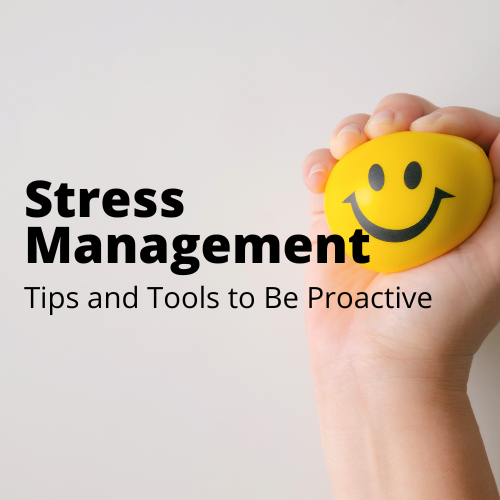
Stress Management | Tips and Tools to Be Proactive
How to Be Proactive About Stress Management
Everyone, especially over the past year has experienced a large amount of stress and may have heard people talk about stress management. But what exactly is stress management and what can you realistically do? Not everyone has had or is receiving the guidance of a counselor/therapist. Additionally, it can be hard to take a step back from the situation and evaluate yourself to figure out how to emotionally and mentally manage it so it doesn’t become consuming. Here are some steps to understand the type of stress and what you can do to proactively manage it.
Stress and stressors
Stress is the reaction to a stressor. For example a stressor would be the loss of a job, a sickness or a broken down car. When these things happen a typical response would be a higher heart rate, blood pressure and/or mental alertness. During times of stress our ability to pay attention can also decrease. There are certainly “healthy” stressors like an athletic competition but in this article we will focus on the help with the “unhealthy” ones.
Identify your stressors and triggers
Take a step back, sit down and think: What stresses me out in my life that is within my control? Many people experience anxiety when they’re late for a commitment. Similarly, some have stress when they expect guests in their home. Further, during PMS there are a percentage of women that experience sharp increases in anxiety for a few days.
When you identify what triggers your stress, you can begin to proactively plan for it. For example, always leave 10 minutes earlier than the GPS predicts with traffic, keep your guest limited to only those you trust or a smaller group of people and tell yourself during PMS “it is only for a few days, it’s only due to the PMS”.
Some triggers may require a deeper look and other breathing techniques to slow your heartrate. It is extremely helpful to keep a healthy routine that includes meditation, yoga or some form of daily exercise to help release healthy endorphins back into your body.
Other helpful strategies
Eat healthy foods. When you feed your body nutritious food it works better for you. Minimize or eliminate soda, candy or other junk foods and replace it with healthier alternatives.
Celebrate small “wins”. If you made it on time to that appointment or you held to your boundary of only allowing four people over for dinner – give yourself a moment of appreciation. Every small “win” leads to more small “wins” which will lead to big “wins”, which leads to healthier emotional habits.
What if these aren’t enough?
Lifeline Connections commits to long-term mental wellness for our patients. We offer an integrated, holistic approach that includes therapy and case management. Our doctors specialize in the treatment of co-occurring mental health and substance use disorders. They work to solve ones that have a compounding effect. Contact us and reclaim your life.
Contact a doctor for a referral or find a therapist. They can work to design a custom plan for wellness. Secure treatment is over the phone or computer with telehealth, providing coping skills for grief, loss, depression and anxiety. They will work with you one-on-one to get you feeling better.
